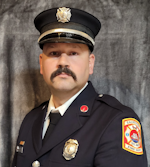We are the heroes, the pillars of virtue in our community, the go-to’s, the fixers, but who are our saviors and heroes? We sit around the firehouse table with some of our best friends and cope with what we see by telling sick, twisted jokes and making comments that we find hilarious but that would make a civilian cringe. We are an HR nightmare. This is who we are as a group, but who are we when we slow down off duty? How do we truly deal with our thoughts and the unforgettable things that we witness? More importantly, are we truthful with our own selves and do we seek help when we need it, or are we still just the toughest of the tough?
Not so obvious signs
In the past two years, the area where I live and work saw multiple suicides of public servants: one action, one moment, one individual, a million questions that never will be answered. We know from our job that people who commit suicide very rarely announce their intention. They might sit on the ideations for a long time while they appear to live a completely happy and normal life. Other times, it might be an impulsive action that stems from devastating news.
The methods vary, and the purpose can range from malicious intentions to outright despair, and sometimes the outcome is far more tragic than the loss of a single individual, claiming the life of innocent family members. Why do we reach this point? How do we stop it?
We know some of the classic signs of depression to watch for: weight gain, weight loss, sudden mood swings, withdrawing from social situations, etc. What about the signs that we always miss: always out with friends, the life of the party, always seemingly happy? The late comedian Robin Williams said, “I think the saddest people always try their hardest to make people happy, because they know what it’s like to feel absolutely worthless, and they don’t want anyone else to feel like that.” He also stated, “All it takes is a beautiful fake smile to hide an injured soul, and they will never notice how broken you really are.” In retrospect, these statements were a cry for help: In August 2014, Williams died by his own hand at the age of 63. One of the world’s funniest men, always good at making others laugh and enjoy themselves, hid his own demons from the public and then succumbed to them.
Many of us have someone in mind now. It might even be ourselves. If it is the latter, ask yourself, “Am I doing what I must do to fight the darkness, or am I going to let it overtake me?” Then, pick up the phone and call the person who you care most about in this entire world and talk to that person. You won’t be judged.
If the person who came to mind is someone else, call that person right now and invite him or her out to talk. Few people come right out and say that they have a problem, so here is where you become a real friend. Break the ice with something embarrassing about yourself. Show that you opened yourself up and are vulnerable. It will help to reassure that you can be confided in. Who knows, telling someone about the time that you peed in sixth grade gym class could save that person’s life.
Call and talk
We run from fear and hide from shame. We believe that our situations are unique and that no one else would or could understand. However, that’s the furthest from the truth. Help is a phone call away: Yes, that thing that’s in your hand 24/7. Use it!
By now, most, if not all, paid departments have some form of anonymous employee assistance program or a department chaplain who can be reached at any hour of the day. The situation might be different with volunteer departments, particularly in rural areas, but what rural areas do have is an abundance of churches. Although church might not be your thing, there is someone there who will listen and offer comfort, guidance, and support to any and all. If neither of these resources are available, the National Suicide Prevention Lifeline (NSPL) can be reached at 1-800-273-8255.
Call the NSPL, call a friend, call me for crying out loud!
If your phone rings, answer it. It might be the last call that someone ever makes.
In a few years, someone will look through contacts on the phone and see the name of a friend or loved one who never will call, text or FaceTime again, a name that the person just can’t bring himself or herself to delete, the name of someone who long since became a resident of a pine box. Will that be your name or the name of someone who you didn’t take the time to talk to?

Mike Stuart
Michael Stuart is an 18-year veteran of the fire service. He has spent 17 of those years with the Galveston, TX, Fire Department, where he holds the position of engineer. Stuart also is the assistant fire chief of the Bacliff, TX, Volunteer Fire Department.






